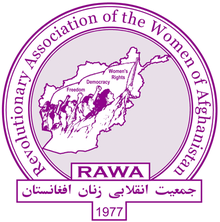Meena Keshwar Kamal
Meena Keshwar Kamal | |
|---|---|
مینا کشور کمال | |
 Meena Keshwar Kamal, 1982 | |
| Born | 27 February 1956 |
| Died | February 4, 1987 (aged 30) Quetta, Pakistan |
| Cause of death | Assassination |
| Nationality | Afghan |
| Education | Kabul University |
| Occupation | Revolutionary political activist, Feminist, Women's rights activist |
| Years active | 1977—1987 |
| Organization | Founder of Revolutionary Association of the Women of Afghanistan (RAWA) |
| Spouse(s) | Faiz Ahmad (1976-1986) |
Meena Keshwar Kamal (Pashto/Persian: مینا کشور کمال; February 27, 1956 – February 4, 1987), commonly known as Meena, was an Afghan revolutionary political activist, feminist, women's rights activist and founder of Revolutionary Association of the Women of Afghanistan (RAWA), who was assassinated in 1987.
Biography[]

In 1977, when she was a student at Kabul University,[2] she founded Revolutionary Association of the Women of Afghanistan (RAWA), an organization formed to promote equality and education for women and continues to "give voice to the deprived and silenced women of Afghanistan". Despite the Saur Revolution and women's rights placed high on the Democratic Republic's agenda,[3] Kamal felt that there was no vast changes of women's deprivation in Afghanistan.[4] In 1979 she campaigned against government, and organized meetings in schools to mobilize support against it, and in 1981, she launched a bilingual feminist magazine, Payam-e-Zan (Women's Message).[5][6][7] She also founded Watan Schools to aid refugee children and their mothers, offering both hospitalization and the teaching of practical skills.[7][8]
At the end of 1981, by invitation of the French Government, Meena represented the Afghan resistance movement at the French Socialist Party Congress. The Soviet delegation at the Congress, headed by Boris Ponamaryev, left the hall as participants cheered when Meena started waving a victory sign.[9][non-primary source needed] She would eventually move and base her RAWA organization in Quetta, Pakistan, in opposition to the Afghan Marxist government.
Personal life[]
Kamal was married to Afghanistan Liberation Organization leader Faiz Ahmad,[10] who was murdered by agents of Gulbuddin Hekmatyar on November 12, 1986.[11][12] Meena was executed less than 3 months afterwards. They had three children, whose whereabouts are unknown.
Assassination[]
Kamal was assassinated in Quetta, Pakistan on February 4, 1987.[13] Reports vary as to who the assassins were, but are believed to have been agents of the Afghan Intelligence Service KHAD, the Afghan secret police, or of fundamentalist Mujahideen leader Gulbuddin Hekmatyar.[2] In May 2002, two men were hanged in Pakistan after being convicted of Kamal's murder.[14]
Legacy[]
In a special issue of Time magazine on November 13, 2006, included Meena among "60 Asian Heroes" and wrote that "Although she was only 30 when she died, Meena had already planted the seeds of an Afghan women's rights movement based on the power of knowledge."[15]
RAWA says of her "Meena gave 12 years of her short but brilliant life to struggle for her homeland and her people. She had a strong belief that despite the darkness of illiteracy, ignorance of fundamentalism, and corruption and decadence of sell outs imposed on our women under the name of freedom and equality, finally that half of population will be awaken and cross the path towards freedom, democracy and women's rights. The enemy was rightly shivering with fear by the love and respect that Meena was creating within the hearts of our people. They knew that within the fire of her fights all the enemies of freedom, democracy and women would be turned to ashes."[9]
An enduring quote from Meena states:[7][16]
Afghan women are like sleeping lions, when awoken, they can play a wonderful role in any social revolution.
See also[]
- Revolutionary Association of the Women of Afghanistan
- Taliban treatment of women
Further reading[]
- Meena - Heroine of Afghanistan, (2003) book by Melody Ermachild Chavis ISBN 0-312-30689-X.
References[]
- ^ "Biography of Martyred Meena, RAWA's founding leader".
- ^ Jump up to: a b Jon Boone (30 April 2010). "Afghan feminists fighting from under the burqa". the Guardian. Retrieved 15 May 2016.
- ^ https://ahtribune.com/history/636-afghan-women.html[unreliable source?]
- ^ Seisab Shahidera, Biswas, P (2014). Afgan Narimukti Andoloner Agnishika (Bengali). Kolkata: Atirikto Publication. pp. 44, 45. ISBN 978-81-928741-0-4.
- ^ "پیام زن، نشریه جمعیت انقلابی زنان افغانستان - راوا". Retrieved 15 May 2016.
- ^ Melody Ermachild Chavis (30 September 2011). Meena: Heroine Of Afghanistan. Transworld. pp. 1–. ISBN 978-1-4464-8846-1.
- ^ Jump up to: a b c Gioseffi, Daniela (2003). Women on War: An International Anthology of Women's Writings from Antiquity to the Present. Feminist Press at CUNY. p. 283. ISBN 978-1-55861-409-3.
- ^ Brave Women in a War-Torn World: RAWA and Afghanistan[permanent dead link]
- ^ Jump up to: a b "Biography of Martyred Meena, RAWA's founding leader". RAWA. Retrieved 15 May 2016.
- ^ With all our strength : the Revolutionary Association of the Women of Afghanistan. New York City: Routledge, 2003. p. 54
- ^ Gulbuddin Hekmatyar, CIA Op and Homicidal Thug
- ^ Models and Realities of Afghan Womanhood: A Retrospective and Prospects Archived 2012-03-13 at the Wayback Machine
- ^ Ramakrishnan, Nitya (May 2013). Books on Google Play In Custody: Law, Impunity and Prisoner Abuse in South Asia. SAGE India. p. 118. ISBN 9788132117513.
- ^ "BBC News - SOUTH ASIA - Afghan activist's killers hanged". 7 May 2002. Retrieved 15 May 2016.
- ^ TIME Magazine | 60 Years of Asian Heroes: Meena Archived January 12, 2007, at the Wayback Machine
- ^ Tamra Orr (15 September 2011). We Visit Afghanistan. Mitchell Lane Publishers, Incorporated. p. 36. ISBN 978-1-61228-102-5.
External links[]
- 1956 births
- 1987 deaths
- Afghan democracy activists
- Afghan feminists
- Afghan people murdered abroad
- Assassinated activists
- Assassinated Afghan people
- Civil rights activists
- People murdered in Balochistan, Pakistan
- Afghan secularists
- Afghan revolutionaries
- Afghan expatriates in Pakistan